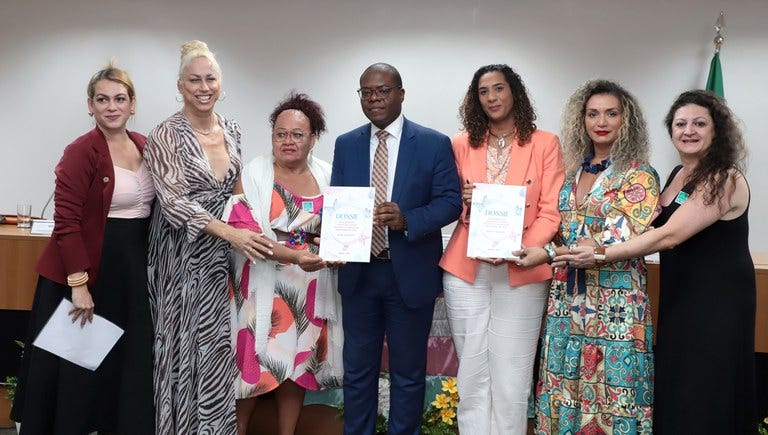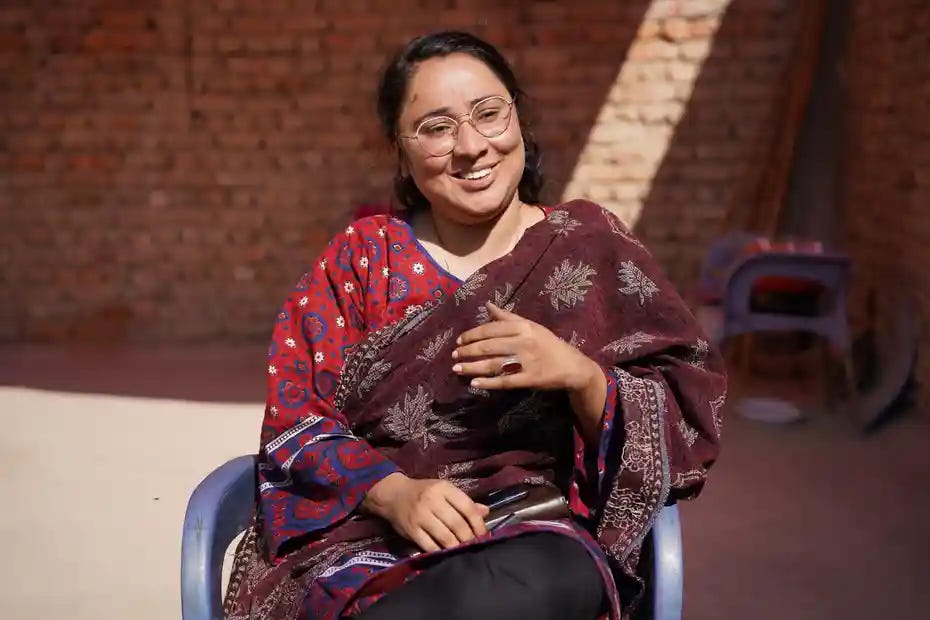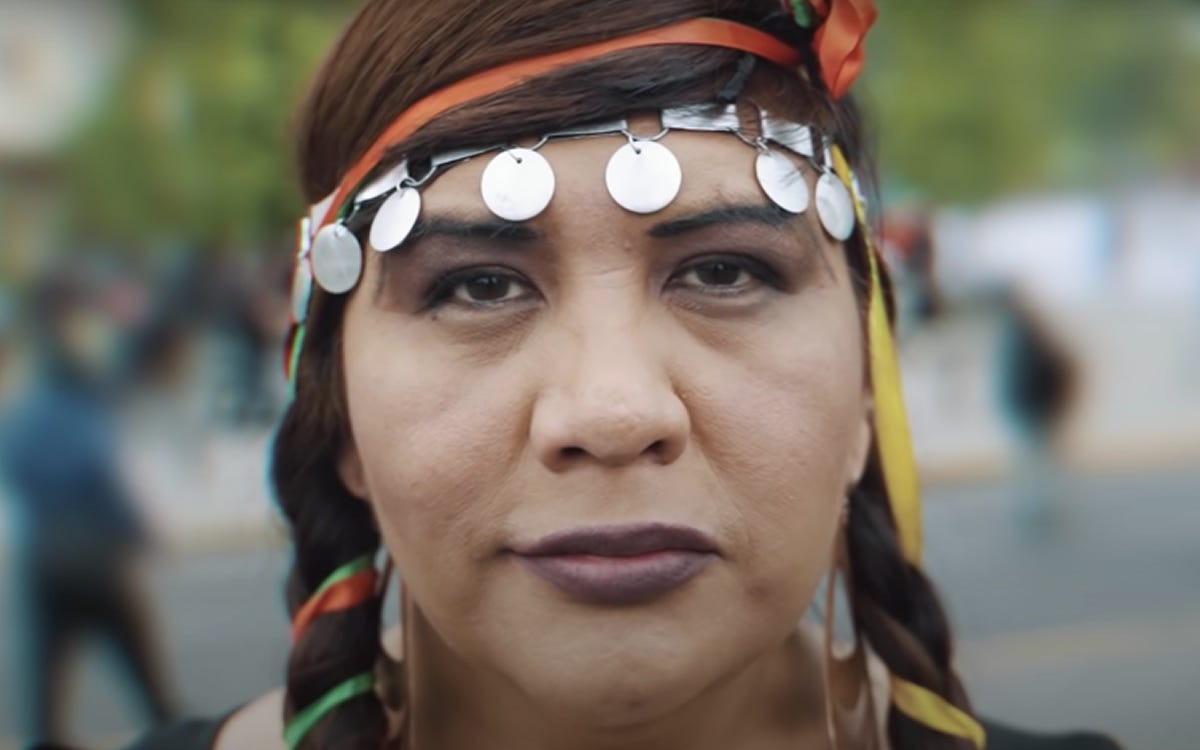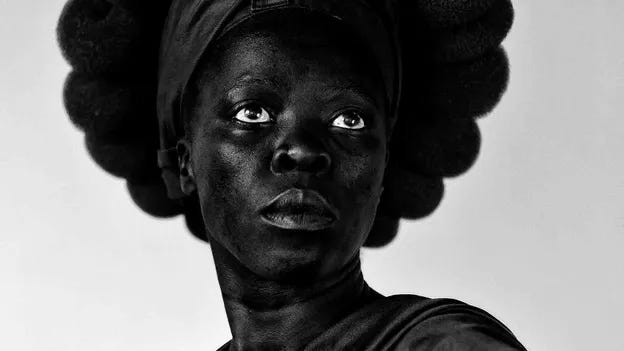Global Roundup: Brazil LGBTQ+ Community, Women Affected by Pakistan Floods, Chile Indigenous Trans Woman, South Africa LGBTQIA+ Visual Activist, Red Ribbon Skirts for Families of MMIWG
Curated by FG Contributor Samiha Hossain
Brazil’s minister of human rights and citizenship, Silvio Almeida, poses with members of the National Association of Transvestites and Transsexuals. Credit: Ascom/MDHC/Clarice Castro Via Xtra*
CW: transphobia and homophobia
Luiz Mott, a retired anthropology professor and gay rights activist in Northern Brazil, is the founder of GGB, Grupo Gay da Bahia. The organization and its team of volunteers have been collecting and disseminating information about the violent deaths of LGBTQ+ people in Brazil since 1980. According to GGB, at least 242 queer and trans people were violently killed in Brazil last year, which equates to one person every 34 hours.
Mott explains that the number of queer people killed in 2022 dropped by 12 percent, compared to the previous year. Despite this, he claims that Brazil is still facing a crisis as the country with the highest number of queer and trans people murdered worldwide. Mott blames former President Jair Bolsonaro’s litany of misogynistic, racist and homophobic comments as factors that have led to heightened tensions.
Although data on hate crimes against queer and trans people is scarce and remains a major global problem, on January 26, members of Brazil’s National Association of Transvestites and Transsexuals (ANTRA) delivered the results of their own report to the country’s newly inaugurated minister of human rights and citizenship, Silvio Almeida. Their report claims that in 2022, at least 131 trans people were murdered in Brazil.
If we do not have the decency to change this reality, then we do not deserve to be a country. -Silvio Almeida
In 2019, six of Brazil’s 11 supreme court judges voted to criminalize acts of homophobia and transphobia in a move that was welcomed by many of the country’s progressive champions, like trans congresswoman Erika Hilton. But some critics say not enough has been done to enforce the legislation and that there is a need for more law enforcement and a better criminal justice system.
Advocates like Gustavo Coutinho, president of the Brazilian Association of Lesbians, Gays, Bisexuals, Transvestites, Transsexuals and Intersex people, say discrimination and violence is still a problem, but they are holding on to hope that President Lula’s new progressive government will usher in a new era for queer Brazilians.
Political violence against LGBTQ+ people is a situation that has grown [under] the Bolsonaro government. We are hopeful and breathing easier, but this new government is a broad coalition with a lot of right-wing representatives, so we need to be careful. -Gustavo Coutinho
Abida Channa.Photograph: Shah Meer Baloch via The Guardian
Abida Channa writes about how she has been helping those affected by the floods in Pakistan last year, particularly women. Channa is a district president of the Women Democratic Front (WDF), a socialist-feminist movement in Pakistan and is district project officer at the NGO Sindh Rural Support Organisation.
Shortly after the floods, the first move for the Women Democratic Front was giving financial assistance to widows, older women and those with health issues who now had no financial support at all – they helped 85 women initially.
Channa speaks about how there were no female toilets at the camps and women would go to the washrooms in groups at night as they lived in fear of being sexually abused or harassed by others at the camps. She also says it was pregnant women who seemed most in need. They had little access to medical care including regular check-ups. Seeing the need, they quickly arranged for a huge medical camp to be set up, with six doctors and specialist women healthcare workers to see patients and distribute medicine. More than 300 people attended in the days after it opened.
During the early days of the relief effort, I couldn’t sleep at night after going to the field. I found it traumatic. I felt helpless not being able to support all the women who needed it. -Abida Channa
Channa also mentions the lighter moments such as how in one village she visited, some women had got hold of a television and managed to connect it to the power so they could all gather together to watch TV dramas and forget their struggles for a moment. Months on from the floods, the work continues as families continue to feel the effects of the aftermath of the floods.
The water is still here and it can get cold. Many families – including mine – have now returned to their dilapidated homes, living in tents within the shells of their buildings. Before they went, we gave them clothes and blankets. And we’re still doing that. This week, we’ll be giving out about 60 blankets to families in one village. The work goes on. -Abida Channa
Claudia Ancapán Quilape (Photo courtesy of AJ+ en Español) via Los Angeles Blade
Claudia Ancapán Quilape is an indigenous Trans woman in Chile. Ancapán is a midwife who works in a private clinic and recently earned a master’s degree in health. She is working on another master’s degree in gender and will soon begin a doctorate in public policy. In addition, she is a spokesperson for Salud Trans para Chile, a Trans rights group, and participates in Santiago’s “LGBTQA+ Roundtable.”
Ancapán for six years fought to have her identity legally recognized, long before Chile passed its Gender Identity Law. She won that battle in 2014 and later lobbied lawmakers to approve the statute.
Ancapán’s family’s indigenous culture allowed her to be herself in private since she was a child. Outside of her home, however, she had to pretend to be a man, she says.
My family allowed me to develop myself and that changed my life. I was always a woman to my father, mother and siblings because my parents were not prejudiced against it. However, they protected me from society and I acted like a man once I walked out the door of my house because people outside our culture would not understand. -Claudia Ancapán Quilape
Most indigenous groups in South America did not view LGBTQ+ people negatively before European colonization. They included them in their respective communities and respected them. European colonizers exterminated many of them and buried their culture.
Since ancestral times there were “machis” called “weyes,” who had an important social and spiritual role within a Mapuche community. They were known for their ambiguous gender roles that could vary from feminine to masculine. “Weyes” could also incorporate feminine elements that had a sacred connotation and were allowed to have same-sex relations with younger men. The “machi weyes” until the 18th century had a lot of authority and influence because they were recognized as a person with “two souls.”
Pre-Columbian cultures saw the integrality of the human being linked to nature, so sexuality was an integral part of a whole (person). So it was not so sinful to fall in love or love a person of the same sex or for a person to present themselves with an identity different from the one they should have biologically. That makes me respect my indigenous background. That’s why I am so proud of who I am and of my native belonging. -Claudia Ancapán Quilape
(Image credit: Somnyama Ngonyama (2016) Zanele Muholi) via BBC
Photographer Zanele Muholi has been documenting the experiences of the Black LGBTQIA+ community in South Africa for two decades. Over the past two years, more than 250 of these works have been exhibited in a travelling retrospective across Europe, including at the Tate Modern in London, and in Berlin, Denmark and Reykjavik.
Muholi refers to themself as a "visual activist" rather than as an artist, which they believe better describes their practice. According to Muholi, working with visual mediums allows their work to be accessible to a range of people. It ensures "that those who might not be able to read or write, or do not have an understanding of the [language] attached to queerness" can digest their message.
Muholi was raised by a single mother under apartheid. They initially turned to image-making as a process of self-healing. They co-founded the Forum for the Empowerment of Women (FEW), a black lesbian rights organisation. A core part of Muholi's oeuvre was and still is about providing visibility for the LGBTQIA+ community that is not entrenched in victimhood.
We are only written about in history when one of us has become violated somehow, which then makes us a spectacle. I'm bringing celebration in [to the narrative] and commemorating all those that came before us. -Zanele Muholi
Faces and Phases is an ongoing collection of more than 500 black-and-white portraits of black lesbians and transgender people, depicted by Muholi in the ways the individuals themselves wish to be seen. In each image, the person looks straight at the camera, seemingly demanding the viewer to look at them properly. Muholi calls each person featured in Faces and Phases a "participant," highlighting the collaborative approach to image-making in the series.
There is already that hierarchy that places the photographer on top, and those being photographed are perceived as subordinates. I choose to break these hierarchies. There is no subject because the people being photographed are the kings and queens who define what we do. They are the ones who are supposed to be on top of the pedestal because, without them, there are no photographs. -Zanele Muholi
A goal for Muholi is that one day, there will be a space for creations of and by LGBTQIA+ Black people in their homeland.
It's about time that we have a museum in Africa that is dedicated to queer and trans lives because, for too long, we have been contributors, but representation is less. It is that absence that I want to undo. -Zanele Muholi
Volunteers come together to make ribbon skirts for families of MMIWG. Haley Lewis via Global News
Jamie Smallboy remembers being on the brink of giving up after struggling with addiction, becoming homeless and being told she could never see her kids again when she woke up to the sounds of drumming one early morning in Vancouver’s Downtown Eastside. She followed the drums, turning a corner to see thousands of people marching. What she stumbled upon was the Women’s Memorial March — an annual march held on February 14 to honour MMIWG whose lives were taken in Vancouver’s Downtown Eastside.
I remember crying because I know some that are still missing today, we don’t know where they are. And, you know, it just it really touched my heart that the way they’re being honoured. -Jamie Smallboy
She has now turned her life around and the events of that day inspired her to start the Red Ribbon Skirt Project which aims to sew 100 ribbon skirts for families of MMIWG. Across many Indigenous cultures, ribbon skirts are reserved for special ceremonies and events. The colours of the ribbons and colours of the skirts themselves hold meaning.
What I’ve learned is the colour red is a colour that the spirits recognize. So my vision was if I could make these skirts, these 100 skirts, give them to families, then the loved ones that passed on could see them, they’d recognize them in red and come march with them. -Jamie Smallboy
The project is in its fourth year and has grown exponentially from being just Smallboy and her family to dozens of volunteers and chapters being started in other provinces as well.
The gifting of the skirts (needs to continue) because it helps women reclaim their identity as Indigenous people. And if we don’t start teaching people how to respect and protect our women, then how do we expect the violence against women to stop? -Jamie Smallboy
Samiha Hossain (she/her) is a student at the University of Ottawa. She has experience working with survivors of sexual violence in her community, as well as conducting research on gender-based violence. A lot of her time is spent learning about and critically engaging with intersectional feminism, transformative justice and disability justice.
Samiha firmly believes in the power of connecting with people and listening to their stories to create solidarity and heal as a community. She refuses to let anyone thwart her imagination when it comes to envisioning a radically different future full of care webs, nurturance and collective liberation.






